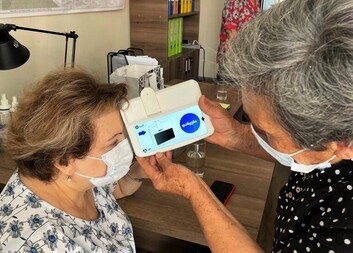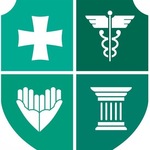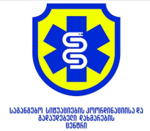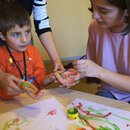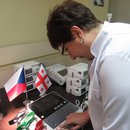Telemonitoring has become especially important during the COVID-19 pandemic when patients became worried about the possibility of transmitting the infection during the visits to clinics. Caritas Czech Republic is piloting a Slovak-made innovative solution Scase that will help Georgia’s primary health care system in telemedicine. Scase is a portable medical diagnostic device that can measure four vital signs at the same time.
Portable Diagnostic Device Accessible to Everyone
Thanks to the financial support from Czech Development Agency, Caritas Czech Republic experts and rural nurses from the Dusheti ambulatories participated in the trainings delivered by the Scase team. Scase is a multifunctional medical diagnostic solution that can be used as a thermometer, glucometer, pulse oximeter, and blood pressure monitor at the same time. The Scase solution combines a digital patient database including reminders, tailor-made questionnaires, measurement, and drug-taking plans. The device connects to a digital platform that enables two-way communication, visualization, and transmission of patient vital signs data accessible by a healthcare provider, doctor, patient, and relatives.
The solution was created in Slovakia by a team lead by Martin Pekarčík, who is a Chief Executive Officer of Scase. Scase has been already piloted in many countries including Slovakia, North Macedonia, Serbia, Moldova and Albania.
“We at Scase are grateful for getting a chance to start with the implementation of our Scase solution right with CCR in rural areas of Dusheti. The need for such a solution is absolutely necessary and will help local people to make primary healthcare more accessible in any way. Scase will be used by medical staff who will get rid of paper and will track all data on our platform. This innovation will help with an overview of the health status in monitored areas and so the treatment will be tailor-made for the demand of such population,” states Tatiana Siskova, Project Manager at S-Case.
Scase team represented the innovative solution to the Caritas Czech Republic medical experts and rural nurses in Tbilisi. Then, they traveled to Dusheti to test the device on a spot, in the rural ambulatories. After the local nurses got acquainted with how the solution works, Scase team left them five devices.
“S-case will be a useful solution for strengthening capacity of rural medical personnel in the diagnostics of rural population in the areas where doctors are unavailable. It will significantly facilitate the management of chronic diseases in rural settings and will improve the role of nurse in the prevention and management of most common medical conditions,” says Rusudan Chkhubianishvili, Caritas Czech Republic project manager.
CCR's Role in Georgia's Primary Health Care
Since 2015, Caritas Czech Republic has been supporting the Georgian Government aiming to reform the health care and social sectors. Piloting Scase in the Dusheti municipality is a part of Caritas Czech Republic's broader contribution to the country's health care system, especially at the PHC level.
Thanks to the financial support from Czech Development Agency, in July 2021, Caritas Czech Republic presented a Unified Electronic Management Information and a 0-6 Child Health and Development surveillance Information Systems to the Ministry of Health of Georgia. Moreover, CCR experts developed clinical practice guidelines and protocols and are piloting them at primary healthcare facilities (in the municipalities of the Mtskheta-Mtianeti and Samegrelo-Zemo Svaneti) based on the clinical topics selected jointly with the Ministry of Health of Georgia. A primary focus is placed on the most common non-communicable diseases: diabetes, hypertension, cardio-vascular diseases, chronic lung diseases, dyslipidemia as well as preventive care related protocols such as surveillance over 0-6 child health and development, examination of well persons aged 18-65 and above 65. The most important benefit of clinical practice guidelines is their potential to improve both the quality of process of care and patient outcomes.
In addition to the trainings, the PHC experts are providing coaching and regular supportive supervision to the medical staff in the selected municipalities of Dusheti and Zugdidi with the aim to engage family physicians in quality improvement activities. Those are essential to achieving the aim of improving the health of the population, enhancing patient experiences and outcomes and improving PHC provider capacity
Furthermore, after the COVID-19 outbreak, CCR rapidly tailored its activities to cope with the pandemic, and with this in mind, conducted online trainings in the management of the COVID-19 cases, post-covid complications, and vaccination side effects for rural doctors. Moreover, CCR handed over 50 computers to local ambulatories to effectively implement their clinical practice.
Caritas Czech Republic continues to support the strengthening of the Georgian healthcare system.

